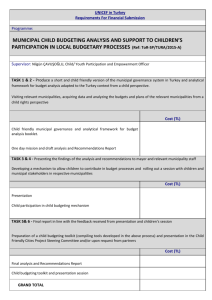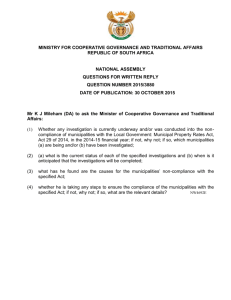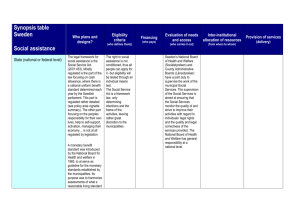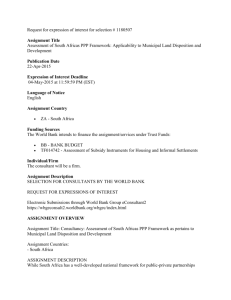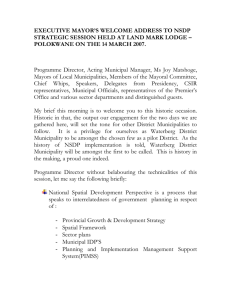Reforming Municipal Government: Regional Government as the Protector of Municipal Autonomy Robert Keenan
advertisement
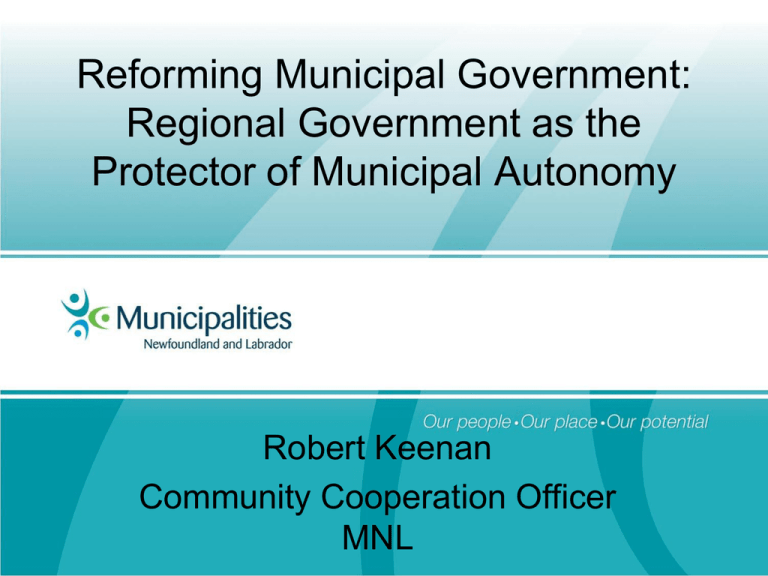
Reforming Municipal Government: Regional Government as the Protector of Municipal Autonomy Robert Keenan Community Cooperation Officer MNL New Name - Same Mandate • No longer CCRC. • Now referred to as Community Cooperation and are a fully integrated part of MNL • No longer see this logo: Why Write a Paper on Regional Government • Complex Reasons: • First, the timing for such a paper seemed right given the cyclical nature of municipal reform. • Second, there is significant concerns regarding the future of municipal government in Newfoundland and Labrador. Municipalities are a cross-roads, and we want to present a good path to follow. The Genesis of the Regional Government Paper • No real mandate when the process started. • Cautioned to keep it under 50 pages – ended up being 170 pages • Supposed to be 1 paper – ended up as 3. • Started as a regional government paper – ended as part of the Regional Government Initiative. What We Hope the Regional Government Papers Will Achieve 1. We want to give you a reason to care about Regional Government. 2. We want to educate you as to the current condition of municipal government in Newfoundland and Labrador 3. We want to educate you on what Regional Government is. What are the options that are available? How will it work in the current municipal system? 4. We want to start a debate on the future of municipal government and the merits of a Regional Government system. Lessons From Our Past Post-Confederation Factors • Two Pillars of Support 1.Cod Fisheries: important for settlement pattern 2. High Provincial Transfers: supported municipal incorporation. Regional Institutions • Municipally-created Regional Institutions: MNL, Joint Councils, Regional Development Associations (RDA). • RDAs and Joint Council: generally weak, poorly funded. • Provincially-created Regional Organizations: Regional Economic Development Boards, Regional Service Authorities, the Rural Secretariat • Better funded. Not fully controlled by municipalities. Current Assessment of Municipalities • Not Very Positive: Age of Key Infrastructure Maintenance of Key Infrastructure Other Services Beyond the capacity of Most Towns • Only 50% of towns have municipal plans. Half of the plans in existence are older than 10 years old. • Only 14.5% of towns have economic development plans. Shattered Window of Municipal Governance Joint Councils REDBs Rural Secretariat Provincial Government RDAs Municipalities Regional Service Authorities A Note of Explanation • Problems with the current municipal system are not the fault of the regional organizations. • Organizations do not create themselves. • Regional Organizations do essential work that most municipalities would or could not do on their own. Who’s to Blame for the Current State of Municipalities • Everyone and No One. • It is the Municipal System’s fault: created a system that does not encourage or require municipal collaboration. • Municipalities are competitors, not partners. More important to be close with the provincial government than neighboring municipalities. Who’s to Blame for the Current State of Municipalities • Everyone is to Blame: • Municipalities are not organized to demand better. • Neither municipal nor provincial leaders are showing the political leadership needed for municipal reform. What About the Regional Council Option in the Municipalities Act • Not very good. Presents the illusion of regional government. • Regional Council option only create weak regional government. That causes more problems. • Regional Government cannot be an option. It has to be mandatory. Optional regional government is weak regional government. What MNL Thinks Regional Government Should Do • It should be a new system. A break from the old way. • It should Promote and Protect the interests of municipalities. • It should alleviate some of the burdens faced by municipalities. • It should provide services municipalities currently cannot provide. • It should make local government stronger and more organized. What Will Regional Government Look Like • We are not prejudging what form regional government will take. • We present 7 different models in the paper. • Please note: no system of regional government from another jurisdiction can be replicated in this province. • Doesn’t mean that we can’t copy some things we like. Specific Responsibilities of a Regional Government • Regional government needs specific responsibilities. • This will ensure that regional government is respected and taken seriously. • Already have the option of weak regional government – not very attractive. Specific Responsibilities of a Regional Government • Direct Level of Local Government for Local Service Districts and Unincorporated Areas - Need to eliminate the governmental black holes in the system. - Benefit municipalities by having LSD and unincorporated areas paying their share. - Benefit LSDs and unincorporated areas by providing better levels of services and the opportunity to share more resources. - Regional government should be presented as a reasonable option to these areas. It will provide them with a voice and protect their interests. Specific Responsibilities of a Regional Government • Land-Use Planning and Economic Development: - Both of these need to be brought under complete municipal control. - Accountable economic development is needed for municipal sustainability. Specific Responsibilities of a Regional Government • The ability to collect a regional tax from all residents, including those in a municipality. - No regional government model in the paper allows for this. - These models are compensated, however, by: 1. Strict legislative rules re. payment to the regional authority. 2. Municipalities that are good at collecting taxes. Specific Responsibilities of a Regional Government Specific Responsibilities of a Regional Government - It is terrible to have a system where the regional government is always fighting to get paid from debtor municipalities. - That system would build conflict, not collaboration. - A regional government will be better supported and more accountable with regional taxation. People care about what they pay for. Specific Responsibilities of a Regional Government • Robust Dispute Resolution Mechanism: - This is necessary for any multimunicipality organization. - Should be legislatively created and consistent across the province. - Municipalities need to know that disputes won’t keep the regional government from functioning and advancing an agenda. Next Steps • Municipal Consultations (6-12 months): - We plan to come to your community to hear your thoughts and concerns. - In particular, we want you to imagine what regional government would look like in your region. Next Steps • New Research Project on Municipal Revenue - We hope to engage Wade Locke of Memorial University to conduct an in-depth analysis of current and potential forms of municipal revenue. - Regional government may provide the capacity needed for meaningful municipal revenue reform. Next Steps • Reform Municipal-Provincial Relations: - Need to establish a new framework. - Should be based on: 1. Respect for municipal government as a level of government. 2. Greater provincial consultation with municipalities on all issues that affect municipalities. 3. No off-loading of services to municipalities without an adequate transfer of revenue. Next Steps • Municipal Stress Tests: - Assessing the stress of municipalities will assist in highlighting the need for municipal reform. - It will also assist in the delineation of regional boundaries. - 3 Parts to the stress test. I will explain two (the third will be presented tomorrow morning). Part 1 of Stress Test • Revisiting the Municipal Self-Assessment Survey: - Self-Assessment survey did not allow for answers to be qualified. - We need to ask “why?” after every question to find out how municipalities function. - More an assessment than self-assessment. Part 2 of Stress Test • Municipal Benchmarks: - Municipalities currently have no means of measuring whether they operate effectively and efficiently. - As a result, it is difficult to properly plan and prioritize. - MNL plans to partner with PMA to establish a set of municipal benchmarks. - Process must be led by municipal leaders and administrators. In Closing… • The Challenge: Municipal politicians must have more than 4 year goals and memories. • Future of many municipalities is at stake. • Have to build a movement for change. In Closing… • Three Questions to Consider: 1. Do you think the current municipal system needs to change? 2. Do you think the sustainability of your municipality is better supported and promoted through greater collaboration with other municipalities? 3. Are you willing to participate in a substantive discussion on regional government in Newfoundland and Labrador? Thank You Robert Keenan Community Cooperation Officer, MNL ccrc@municipalitiesnl.com 709-753-6820
